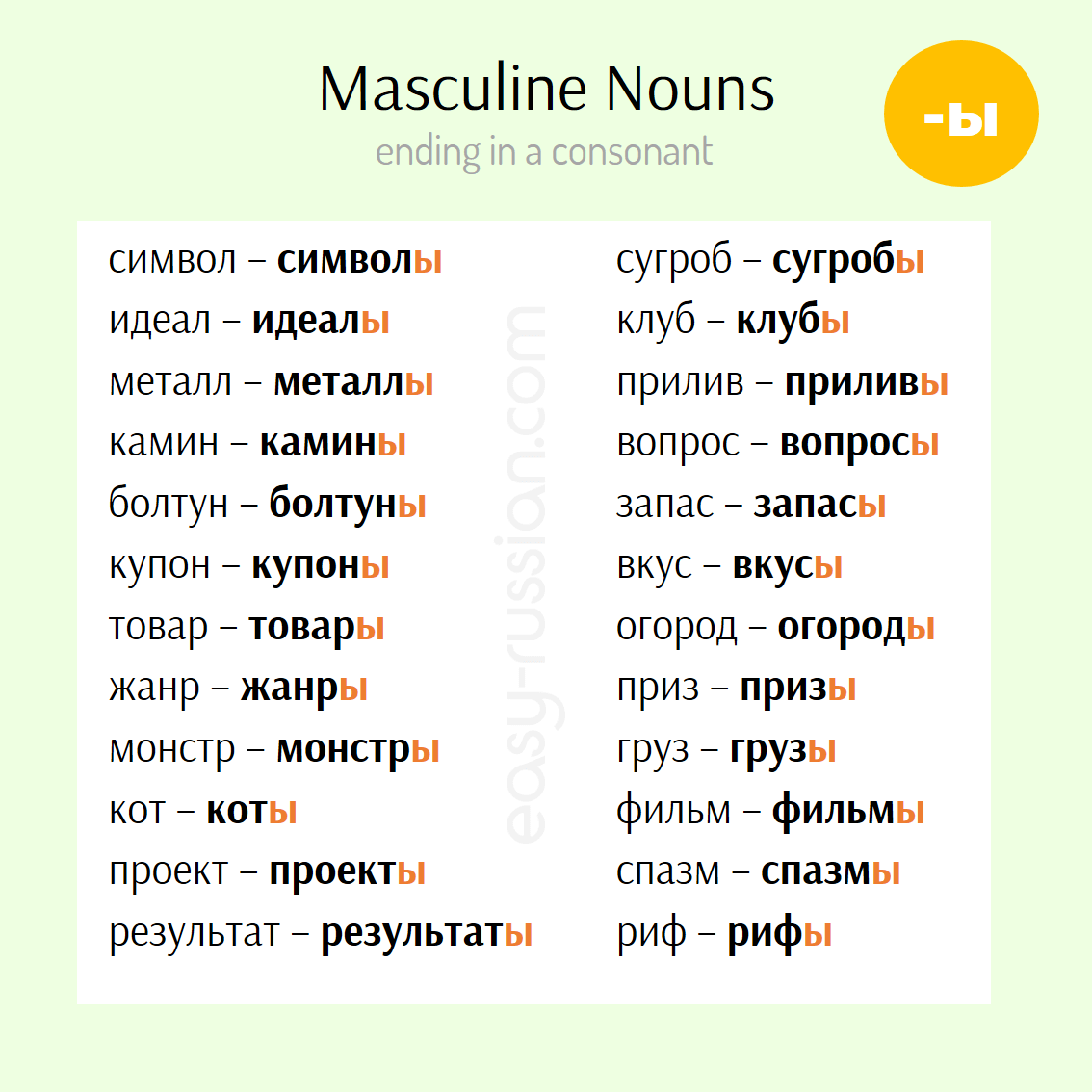Everything You Need to Know About Forming Plural Nouns in Russian
Plural forms of nouns in Russian can be a bit confusing, but there are some general rules that can help you form them correctly. In general, to make a noun plural, you need to change its ending based on its gender and the ending of the singular form. However, there are some exceptions and irregular forms to watch out for.
First of all, most nouns in plural have “ы” at the end.
Ы (и) ending
The letter “ы” is a vowel that is used to form the plural of many masculine and feminine nouns.
If a singular masculine noun ends in a consonant, you typically add “-ы” to make it plural. If a feminine noun ends in “а”, you typically replace it with “-ы”.
Let’s look at the examples.

Masculine nouns ending in a consonant:
- зуб – зубы (tooth)
- атом – атомы (atom)
- диван – диваны (couch)
- стол – столы (table)
- пакет – пакеты (bag)
- магазин – магазины (shop)
- компьютер – компьютеры (computer)
- удар – удары (strike, hit)
- абрикос – абрикосы (apricot)
- соус – соусы (sauce)
- миф – мифы (myth)
- детектив – детективы (detective)
- нерв – нервы (nerve)
- нос – носы (nose)
- офис – офисы (office)
- гриб – грибы (mushroom)
- след – следы (mark, trail)
- курс – курсы (course)
- продукт – продукты (product)
- иероглиф – иероглифы (hieroglyph)
- кот – коты (cat)
- прогноз – прогнозы (forecast)
- вызов – вызовы (call)
- журнал – журналы (magazine)
- чемодан – чемоданы (suitcase)
- ген – гены (gene)
- манекен – манекены (mannequin)
- блин – блины (pancake)
- витамин – витамины (vitamin)
- вагон – вагоны (wagon)
- клоун – клоуны (clown)
- изъян – изъяны (flaw)
- гном – гномы (gnome)
- суп – супы (soup)
- клоп – клопы (bug)
- лжец – лжецы (liar)
Feminine nouns ending in -а:

Read Also: How to determine the gender of a noun in Russian
More examples:
- дыра – дыры (hole)
- стена – стены (wall)
- гора – горы (mountain)
- ссора – ссоры (quarrel)
- тема – темы (theme)
- лампа – лампы (lamp)
- крупа – крупы (groats)
- игла – иглы (needle)
- губа – губы (lip)
- труба – трубы (pipe)
- слива – сливы (plum)
- звезда – звёзды (star)
- ягода – ягоды (berry)
- база – базы (base)
- франшиза – франшизы (franchise)
- травма – травмы (injury)
- фирма – фирмы (firm)
- сторона – стороны (side)
- кукла – куклы (doll)
- тайна – тайны (mystery)
- трава – травы (herb)
- игра – игры (game)
- больница – больницы (hospital)
- альтернатива – альтернативы (alternative)
- актриса – актрисы (actress)
- льгота – льготы (benefit)
- мечта – мечты (dream)
- пуговица – пуговицы (button)
However, if the last consonant of a noun is г, к, х, ч, ж, ш or щ, you can’t use “ы” to make a plural form. You should use -и instead.
This is how it works for masculine nouns:

And these are the feminine nouns:

More examples here:
- аналог – аналоги
- археолог – археологи
- круг – круги
- визг – визги
- враг – враги
- долг – долги
- итог – итоги
- шаг – шаги
- налог – налоги
- психолог – психолог
- бумага – бумаги
- книга – книги
- услуга – услуги
- супруга – супруги
- слуга – слуги
- работяга – работяги
- урок – уроки
- блок – блоки
- бутик – бутики
- загадка – загадки
- шутка – шутки
- рука – реки
- диск – диски
- жулик – жулики
- знак – знаки
- крик – крики
- паук – пауки
- пустяк – пустяки
- ящик – ящики
- старик – старики
- риски – риски
- работник – работники
- подсолнух – подсолнухи
- псих – психи
- олигарх – олигархи
- петухи – петухи
- запахи – запахи
- штрихи – штрихи
- грех – грехи
- стих – стихи
- жених – женихи
- кирпич – кирпичи
- бич – бичи
- кулич – куличи
- силач – силачи
- скетч – скетчи
- скрипач скрипачи
- обруч – обручи
- куча – кучи
- нож – ножи
- ёж – ежи
- бомж – бомжи
- чертёж – чертежи
- муж – мужи
- лужа – лужи
- зародыш – зародыши
- шалаш – шалаши
- крепыш – крепыши
- ковш – ковши
- овощ – овощи
- клещ – клещи
- борщ – борщи
- плащ – плащи
- товарищ – товарищи
- хрящ – хрящи
So, there is no such thing in Russian as “кы”, “гы”, “хы” at the end of the word. “Жы” and “шы” are gramatically incorrect.
Important note: Some nouns lose a vowel from their last syllable when forming plural. It happens mostly with the nouns ending in “ок“, “ец“, “ёл“, but there are also some other nouns that are doing the same thing. You have to remember these words.
Examples:
- сон – сны
- осёл – ослы
- котёл – котлы
- ковёр – ковры
- костёр – костры
- дятел – дятлы (unstressed “е”)
- ветер – ветры (unstressed “е”)
- чехол – чехлы
- мешок – мешки
- платок – платки
- звонок – звонки
- порядок – порядки
- оттенок – оттенки
- лоб – лбы
- шов – швы
- пёс – псы
- птенец – птенцы
- конец – концы
- самец – самцы
- боец – бойцы
- огурец – огурцы
- отец – отцы
- чужестранец – чужестранцы
- юнец – юнцы
- заяц – зайцы
- проходимец – проходимцы
- итальянец – итальянцы
А ending
Some masculine nouns ending in a consonant and neuter nouns in -о have a plural in -а.
This group of nouns is much smaller than the first one.
Thee following masculine nouns end in stressed “а” in plural:
- дом – дома [damA]
- глаз – глаза [glazA]
- адрес – адреса [adryesA]
- голос – голоса [galasA]
- парус – паруса [paroosA]
- рукав – рукава [rookavA]
- паспорт – паспорта [paspartA]
- луг – луга [loogA]
- берег – берега [byeryegA]
- рог – рога [ragA]
- век – века [vyekA]
Neuter nouns:
- яйцо – яйца
- лицо – лица
- слово – слова [slovA]
- место – места [myestA]
- тело – тела [tyelA]
- чувство – чувства
- качество – качества
- свойство – свойства
- право – права [pravA]
- облако – облака [ablakA]
- письмо – письма
- существо – существа [sooshchyestvA]
- благо – блага [blagA]
И ending
Nouns in -ь have a plural in -и:
- ель – ели (spruce)
- дверь – двери (door)
- автомобиль – автомобили (car)
- пельмень – пельмени (dumpling)
- болезнь – болезни (illness)
- жизнь – жизни (life)
- церковь – церкви (church)
- корабль – корабли (ship)
- лошадь – лошади (horse)
- цель – цели (aim, goal)
- ценность – ценности (value)
But: учитель – учителя.
Masculine nouns in -й and feminine nouns in – я also have -и ending in plural:
- пуля – пули
- амбиция – амбиции
- гарантия – гарантии
- деревня – деревни
- идея – идеи
- песня – песни
- капля – капли
- потеря – потери
- эмоция – эмоции
- семья – семьи
- гостья – гостьи
- статья – статьи
- судья – судьи (masculine)
- музей – музеи
- герой – герои
- слой – слои
Some masculine nouns in -й are exceptions of this rule: край – края, улей- ульи, святой – святые, рабочий – рабочие.
Я ending
Neuter nouns ending in “е” have “я” in plural:
- поле – поля
- изделие – изделия
- море – моря
- мгновение – мгновения
- явление – явления
- условие – условия
- здание – здания
- украшение – украшения
- платье – платья
- знание – знания
- мнение – мнения
Special Cases (irregular forms)
Some nouns have irregular plural forms that must be memorized.
- ухо – уши
- ребёнок – дети
- человек – люди
- мать – матери
- дочь – дочери
- сын – сыновья
- брат – братья
- друг – друзья
- стул – стулья
- дерево – деревья
- лист – листья
- цветок – цветы
- имя – имена
- время – времена
- чудо – чудеса
- звено – звенья
- хозяин – хозяева
- плечо – плечи
- колено – колени
- яблоко – яблоки
The only way to learn these exceptions is through practice and exposure to the language.
Nouns that have no plural or singular
Some things cannot be counted, so these nouns have no plural. These nouns are known as “collective nouns” or “mass nouns”, and they refer to groups of objects or substances that are seen as a single entity:
- одежда (clothes)
- мебель (furnitue)
- посуда (dishware)
- аппаратура/оборудование (equipment)
- персонал (staff, personnel)
- молодёжь (youth)
- человечество (humanity)
- листва (foliage)
BUT! Collective nouns do not include words that collect some part of the common and that are countable:
- толпа – толпы (crowd)
- коллектив – коллективы (team, collective)
- группа – группы (group)
- стая – стаи (flock)
- отряд – отряды (squad)
- полк – полки (regiment)
- войско – войска (army, force)
- армия – армии (army)
Substances, liquids, feelings, states of being and abstract ideas also do not have a plural form:
- вода
- молоко
- пиво
- еда
- мясо
- рис
- тесто
- счастье
- горе
- забота
- любовь
- география
- политика
- информация
- детство
Certain nouns in the Russian language have no singular form. The first type of plural-only noun is the object consisting of two parts. These nouns are formed by combining two equal parts that together form a single object:
- очки (glasses)
- ножницы (scissors)
- плоскогубцы (pliers)
- штаны/брюки (trousers)
- трусы (underpants)
- колготки (tights, pantyhose)
- весы (scale)
The second type are the nouns refer to actions that are performed by a group of people:
- выборы – elections
- дебаты – debates
- переговоры – negotiations
- каникулы – vacation (at school or university)
- похороны – funeral
- роды – childbirth
There are also other different nouns that don’t have a plural form in Russian:
- деньги (money)
- часы (clock, watch)
- именины (name day)
- алименты (alimony, child support)
- апартаменты (apartments)
- молодожёны (newlyweds)
- обои (wallpaper)
- бусы (beads necklace)

Some proper nouns (place names) are also used in plural from:
- Афины – Athens
- Филиппины – Philippines
- Курилы – Kuril Islands
- Альпы – Alps
- Кордильеры – Cordilleras
- Карпаты – Carpathians
- Лужники – Luzhniki
Nouns that never change
In the Russian language, there are some nouns that never change their endings when used in the plural form (indeclinable words). These are nouns of foreign origin:
- кино
- фото
- кафе
- метро
- пальто
- шимпанзе
- жалюзи
In conclusion, forming plural nouns in Russian requires paying attention to the gender and ending of the singular form. While there are some basic rules to follow, there are also exceptions and irregular forms to watch out for. With practice and exposure to the language, you’ll become more comfortable with forming plural nouns in Russian.
To form plural nouns in Russian, it’s helpful to practice and memorize the general rules for each gender. With time, exposure to the language, and lots of practice, you’ll become more comfortable with forming plural nouns in Russian.

This was a helpful and fairly comprehensive explanation of plurals. Thank you.
You’re welcome 🙂 Glad it was helpful for you!